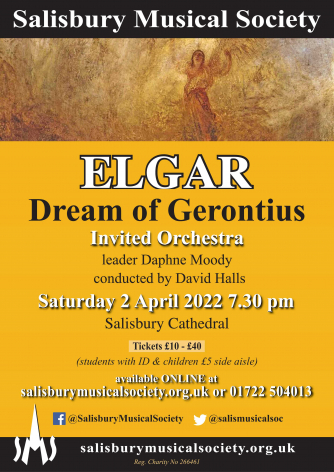Details
Salisbury Cathedral
33 The Close
Salisbury
Wiltshire
SP1 2EJ
England
Programme
Edward Elgar – The Dream of Gerontius, Op.38
Performers
David Halls – Conductor
Catherine Carby – mezzo-soprano
Paul Nilon – tenor
Jonathan Lemalu – Bass
Salisbury Musical Society
Invited Orchestra
Other concerts in this Series (+)
Programme Note
The dramatic poem The Dream of Gerontius tells of a soul leaving the body at the point of death and journeying to come face to face with God 'for one moment'. The poem had a wide appeal to religious minds as soon as it was published. General Gordon had one sent to him in Khartoum in 1884; the markings and underlinings he made in this were copied into a volume which was presented to the organist of St George's Church, Worcester, on his wedding day on May 8th 1889. The organist was Edward Elgar.
In November 1898 Elgar was commissioned to compose a choral work for the Birmingham Triennial Festival in 1900 and chose to set Newman's poem. Dorabella, one of the 'Friends Pictured Within' that make up the Enigma Variations of 1898, told Elgar that one section "gives me the impression of great doors opening and shutting", to which Elgar replied "Does it? That's exactly what I mean."
By April 1900 Elgar was writing to his friend Jaeger, another of the Enigma Variations (Nimrod), expressing concern that the music might not sustain interest and asking Jaeger for his honest opinion, which was duly given in a letter of May 22nd: "Your wonderful music is inexpressibly and most wonderfully elevating, 'aloof', mystic and heart-moving, as by the force of a great compassion."
The Dream of Gerontius was performed in Birmingham on October 3rd 1900, conducted by Hans Richter. It is generally considered to have been one of the most notoriously bad first performances in the history of English music. A performance in Düssseldorf in May 1902, however, confirmed its success and a second complete British performance followed in Worcester in the summer – the future of this great masterpiece was assured.

 Your events at Classical Events
Your events at Classical Events

